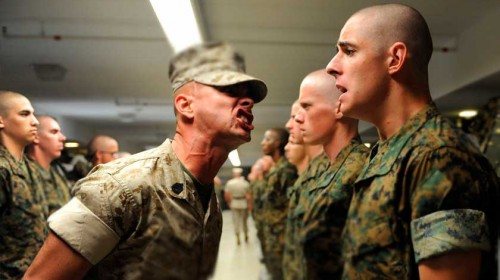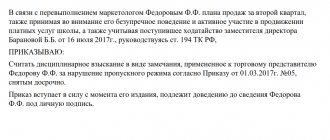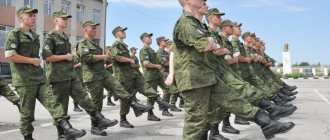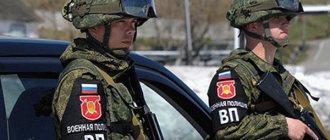Responsibilities of a serviceman to maintain military discipline
(Article: 1. Responsibilities of a serviceman to maintain military discipline)
1.
Military discipline
is strict and precise observance by all military personnel of the order and rules established by the laws of the Russian Federation, general military regulations of the Armed Forces of the Russian Federation (hereinafter referred to as general military regulations) and orders of commanders (chiefs).
3. Military discipline obliges
each military personnel:
- be faithful to the Military Oath (obligation), strictly observe the Constitution of the Russian Federation, the laws of the Russian Federation and the requirements of general military regulations;
- perform your military duty skillfully and courageously, conscientiously study military affairs, take care of state and military property;
- to unquestioningly carry out assigned tasks in any conditions, including at the risk of life, to steadfastly endure the difficulties of military service;
- be vigilant, strictly keep state secrets;
- support the rules of relationships between military personnel determined by general military regulations, strengthen military camaraderie;
- show respect to commanders (superiors) and each other, observe the rules of military greeting and military courtesy;
- behave with dignity in public places, prevent yourself and restrain others from unworthy actions, help protect the honor and dignity of citizens;
- comply with the norms of international humanitarian law in accordance with the Constitution of the Russian Federation.
8.
Each serviceman is obliged to assist the commander (chief) in restoring order and maintaining military discipline. A serviceman bears responsibility for evading assistance to the commander (superior).
Disciplinary Charter of the Armed Forces of the Russian Federation
approved by Decree of the President of the Russian Federation of November 10, 2007 N 1495
2.1. Incentives applied to soldiers (sailors)
(Article: 2.1. Incentives applied to soldiers (sailors))
20. To soldiers and sailors
The following incentives apply:
- removal of previously applied disciplinary sanction;
- announcement of gratitude;
- a message to the homeland (at the place of residence of the serviceman’s parents or persons in whose care he was) or to the place of the serviceman’s previous work (study) about his exemplary performance of military duty and about the incentives received;
- rewarding with a certificate, valuable gift or money;
- awarding a personal photograph of a serviceman, taken with the military banner of the military unit unfurled;
- assignment of the military rank of corporal (senior sailor);
- awarding an excellent student badge;
- entering the names of distinguished soldiers (sailors) into the Book of Honor of a military unit (ship).
All types of incentives specified in this article are applied to military personnel performing military service under a contract as soldiers (sailors), with the exception of those provided for in paragraph “c”.
What types of incentives can be applied to military personnel?
Incentives for military personnel directly depend on discipline and how the military man conducts his service.
Compliance with all rules and regulations, as well as promoting the development and strengthening of military discipline , allows the military to receive various bonuses and awards.
Approved by the “Disciplinary Charter of the Armed Forces of the Russian Federation” dated December 14, 1993, No. 2140. The soldier’s relatives are not deprived either; an increase in the soldier’s leave will please loved ones.
Types of incentives for soldiers, sailors, petty officers and sergeants:
- removal of penalties received as a result of a decline in discipline;
- giving thanks;
- in case of worthy performance of military duty, achievements are reported to relatives or at the place of study;
- award in the form of a chevron;
- monetary rewards, significant gifts, certificates;
- personal photograph of a military man, when removing the Battle Banner of a military unit;
- faster attainment of the next military rank, but not higher than the rank established by the standard;
- the names of distinguished military personnel are included in the Book of Honor;
Bonuses also apply to contract employees , the same as described above, with the exception of notification to relatives about the soldier’s merits. Depending on the rank, there are differences between the types of incentives.
Incentives assigned to officers:
- cancellation of a previously applied penalty received as a result of a disciplinary violation;
- rewarding with gratitude;
- presentation of a certificate, valuable (personalized) gift, monetary incentive;
- entering the names of worthy officers into the Book of Honor of a military unit (for a Navy ship);
- receiving a military rank, one step higher than the regular one, but not higher than the rank of major, captain of the third rank. A military man who has an academic degree or academic rank, no higher than colonel, captain of the first rank;
- early promotion to a military position;
- awarding with bladed or firearms.
There are incentives for students in military institutions ; their names are included on the Honor Board. If cadets graduate from an educational institution with a gold medal and receive a diploma with honors.
2.2. Disciplinary sanctions applied to soldiers (sailors)
(Article: 2.2. Disciplinary sanctions applied to soldiers (sailors))
55. To soldiers and sailors
The following types of disciplinary sanctions may be applied:
- rebuke;
- severe reprimand;
- deprivation of regular dismissal from a military unit or from a ship to shore;
- deprivation of an excellent student badge;
- warning about incomplete professional compliance;
- reduction in the military position of corporal (senior sailor);
- reduction in military rank of corporal (senior sailor);
- reduction in military rank with reduction in the military position of corporal (senior sailor);
- early dismissal from military service due to failure to fulfill the terms of the contract;
- disciplinary arrest.
All types of disciplinary sanctions specified in this article, with the exception of those provided for in paragraphs “d” and “i”, are applied to soldiers (sailors) undergoing military service under conscription, and to those undergoing military service under a contract - with the exception of those provided for in paragraph “c” .
The disciplinary sanction provided for in paragraph “k” of this article is not applied to female military personnel serving as soldiers (sailors).
In addition to the disciplinary sanctions specified in this article (except for the disciplinary sanction provided for in paragraph “i”), cadets of military educational institutions of professional education may be subject to a disciplinary sanction - expulsion from the military educational institution of professional education.
Disciplinary Charter of the Armed Forces of the Russian Federation
approved by Decree of the President of the Russian Federation of November 10, 2007 N 1495
Who has the right to apply penalties and incentives?
Penalties and incentives can only be applied by direct superiors over military personnel, unit commanders . Arrest can only be applied by a garrison judge. Commanders apply rewards and punishments in connection with their position; if their position is temporary, then with the position established in the order.
Seconded officers, together with their units, enjoy rights a step above the power assigned to their position. Also with officers from military educational organizations.
Civilian military personnel, if they are in temporary positions, have the right to apply incentives and penalties to military personnel in connection with their position.
Higher commanders cannot cancel the penalties and rewards of subordinate commanders if they did not exceed their authority. The Minister of Defense has absolute disciplinary power over military personnel.
The procedure for applying incentives and disciplinary sanctions
(Article: 3. Procedure for applying incentives and disciplinary sanctions)
26.
Military personnel, regardless of military rank and military position, are equal before the law and may be subject to disciplinary, administrative, material, civil and criminal liability, depending on the nature and severity of the offense they committed.
27.
Military personnel are subject to disciplinary liability for disciplinary offenses, that is, for unlawful, guilty actions (inaction), expressed in violation of military discipline, which, in accordance with the legislation of the Russian Federation, do not entail criminal or administrative liability.
Charter of the Internal Service of the RF Armed Forces
approved by Decree of the President of the Russian Federation of November 10, 2007 N 1495
3.1. Procedure for applying incentives
(Article: 3.1. Procedure for applying incentives)
34.
Commanders (chiefs) can apply incentives both to an individual serviceman and to the entire personnel of a military unit (unit).
For one distinction, a serviceman can be promoted only once.
When determining the type of incentive, the nature of the merits, diligence and distinction of the serviceman, as well as his previous attitude towards military service are taken into account.
35.
A serviceman who has a disciplinary sanction can be rewarded only by removing the previously applied sanction. The right to lift a disciplinary sanction belongs to the commander (chief) by whom the sanction was applied, as well as to his direct superiors, who have no less disciplinary power than him.
The right to lift disciplinary sanctions specified in Articles 75-79 of this Charter belongs to the direct commander (chief), who has disciplinary power no less than the commander who applied the penalty.
Only one disciplinary sanction can be removed from a serviceman at a time.
The commander (chief) has the right to lift a disciplinary sanction only after it has played its educational role and the serviceman has corrected his behavior by exemplary performance of military duty.
36.
The removal of a disciplinary sanction -
disciplinary arrest
- is carried out by the commander of a military unit, if the serviceman does not commit a new disciplinary offense: for soldiers and sailors - no earlier than three months after the execution of the decision of the judge of the garrison military court to impose disciplinary arrest.
Removal of disciplinary action - reduction in military rank (position)
- from soldiers (sailors) is carried out no earlier than six months from the date of its application.
Soldiers and sailors are restored to their previous military rank only when they are appointed to the appropriate military position.
Disciplinary action - reduction in military rank
- can be removed from a serviceman without simultaneously reinstating him to his previous position.
Removal of a disciplinary sanction - warning of incomplete official compliance
- carried out no earlier than one year from the date of its application.
37.
Encouragement -
a declaration of gratitude
- is applied both to an individual serviceman and to the entire personnel of a military unit (unit).
38.
Encouragement -
a message to the homeland (at the place of residence of the serviceman’s parents or persons in whose care he was) or to the place of the serviceman’s previous work (study) about the exemplary performance of his military duty and about the incentives received
- applies to military personnel undergoing military service upon conscription . In this case, a letter of commendation is sent to the serviceman’s homeland (at the place of residence of the serviceman’s parents or persons in whose care he was raised) or to the place of his previous work (study) with a message about his exemplary performance of military duty and about the incentives received.
39.
Encouragement -
awarding a diploma, a valuable gift or money
- is applied to all military personnel, while the diploma is awarded to both individual military personnel and the entire personnel of a military unit (unit), as a rule, at the end of the training period (academic year), upon dismissal from military service, as well as when summing up the results of a competition.
40.
Encouragement -
awarding a personal photograph of a serviceman, taken with the military banner of the military unit unfurled
- is applied to soldiers, sailors, sergeants and foremen.
The serviceman in respect of whom this incentive is applied is awarded two photographs (soldiers are photographed in full dress uniform, with weapons) with text on the back: to whom it was awarded and for what.
41.
Incentives—
the conferment of the military rank of corporal or senior sailor
—are applied to military personnel for special personal merit.
42.
Encouragement -
awarding an excellent student badge
- is announced by order of the commander of a military unit and is applied to soldiers and sailors who were excellent students during one period of training, as well as to cadets of military educational institutions of vocational education who were excellent students during the academic year.
43.
Encouragement -
entering
the names of distinguished military personnel
(ship) - is announced by order of the commander of the military unit and is applied in relation to:
- soldiers and sailors of the last period of training, undergoing military service upon conscription, who have achieved excellent performance in combat training, who have shown impeccable discipline and high consciousness during service - before dismissal from military service (cadets and students of military educational institutions of vocational education - upon completion of training) ;
- military personnel undergoing military service under a contract, for impeccable service in the Armed Forces of the Russian Federation, as well as all military personnel who particularly distinguished themselves in the performance of their military duty - during the entire period of their military service.
When an order is announced to be included in the Book of Honor of a military unit (ship), the serviceman is presented with a certificate of commendation signed by the commander of the military unit (ship). The entry in the Book of Honor of a military unit (ship) of the name of a serviceman undergoing military service upon conscription is, in addition, reported to his homeland (at the place of residence of the serviceman’s parents or persons under whose care he was) or to the place of the serviceman’s previous work (study).
45.
Incentives are announced before the formation, at meetings or conferences of military personnel, in orders or in person.
The announcement of orders to encourage or reward distinguished military personnel is usually carried out in a solemn atmosphere.
Simultaneously with the announcement of the order of encouragement, military personnel, as a rule, are presented with certificates, valuable gifts or money, personal photographs of military personnel taken with the combat flag of the military unit unfurled, merit badges, and the text of the message to their homeland is read out (at the place of residence of the serviceman’s parents or persons , under whose care he was) or at the place of the serviceman’s previous work (study) about the exemplary performance of his military duty.
46.
A serviceman is considered to have no disciplinary sanctions after they are lifted by the relevant commander (superior) or after one year has passed from the date of the last penalty, unless another disciplinary sanction was applied to him during this period.
How are disciplinary sanctions carried out?

Each serviceman has his own card, where all the rewards and penalties he received during his service are entered.
Penalties have their own statute of limitations, so they must be applied immediately as soon as a violation or crime in relation to military service has been identified.
The execution procedure is regulated in the Disciplinary Charter:
- a reprimand and a severe reprimand must be applied with a mandatory indication of the reason;
- deprivation of leave indicates that the serviceman is in a unit, lasting one week;
- cancellation of the chest chevron is used during formation, by order of the authorities;
- the issuance of a penalty for official inconsistency can be executed once during service in a certain position. If the serviceman does not correct his behavior within 30 days, demotion or dismissal will follow;
- reduction of position is carried out by order of the commander, does not depend on the desire of the culprit;
- When military rank is reduced, time is given to replace chevrons. Humiliation of the dignity of a military personnel is not allowed;
- early dismissal in case of non-compliance with the terms of the military contract is carried out upon completion of service. If a military man has not completed his term, he is sent to complete his term; two months of service are counted as a month of conscription;
- expulsion from a military organization or from military training is applied in case of serious violations in relation to the military organization and the Fatherland;
- The judge's order to arrest the perpetrator must be executed immediately after the penalty is issued. Cancelled only by higher authorities; the application of such penalties is carried out only in extreme cases.
3.2. Procedure for applying disciplinary sanctions
(Article: 3.2. Procedure for applying disciplinary sanctions)
80.
A serviceman who has committed a disciplinary offense may be subject to only those disciplinary sanctions that are determined by this Charter, correspond to the military rank of the serviceman and the disciplinary authority of the commander (chief) who decides to bring the offender to disciplinary liability.
81.
The decision by the commander (superior) to apply a disciplinary sanction to a subordinate serviceman is preceded by a trial.
The proceedings are carried out in order to identify the perpetrators, identify the causes and conditions that contributed to the commission of a disciplinary offense.
The proceedings, as a rule, are conducted by the immediate commander (superior) of the serviceman who committed the disciplinary offense, or by another person appointed by one of the direct commanders (superiors). In this case, the serviceman appointed to conduct the proceedings must have a military rank and military position not lower than the military rank and military position of the serviceman who committed the disciplinary offense.
In the cases specified in Article 75 of this Charter, the proceedings are conducted by the head of the garrison, the senior naval commander, the military commandant of the garrison, the head of military communications on modes of transport, the head of military roads, the military commandant of the railway (water) section and station (port, airport) or persons appointed by them.
The proceedings, as a rule, are conducted without the preparation of written materials, except for cases where the commander (chief) has demanded that the materials of the proceedings be submitted in writing.
The materials of the proceedings regarding gross disciplinary offenses are documented only in writing.
During the proceedings it must be established:
- event of a disciplinary offense (time, place, method and other circumstances of its commission);
- the person who committed the disciplinary offense;
- the serviceman’s guilt in committing a disciplinary offense, the form of guilt and the motives for committing a disciplinary offense;
- data characterizing the personality of the serviceman who committed a disciplinary offense;
- the presence and nature of the harmful consequences of a disciplinary offense;
- circumstances excluding disciplinary liability of a serviceman;
- circumstances mitigating disciplinary liability and circumstances aggravating disciplinary liability;
- the nature and degree of participation of each of the military personnel in the commission of a disciplinary offense by several persons;
- reasons and conditions that contributed to the commission of a disciplinary offense;
- other circumstances that are important for the correct resolution of the issue of bringing a serviceman to disciplinary liability.
The commander (chief) has the right to decide to punish a serviceman who has committed a disciplinary offense using his own authority or, within up to 10 days, to submit to a superior commander (chief) the materials of the proceedings on the commission of a disciplinary offense by the serviceman for a decision to be made.
When a serviceman commits a gross disciplinary offense or upon receiving information about its commission, the immediate commander (superior) of the serviceman is obliged to immediately report this in the prescribed manner to the commander of the military unit.
The commander of a military unit decides to conduct an investigation into the commission of a gross disciplinary offense and appoints someone responsible for its conduct.
The investigation into the fact that a serviceman has committed a gross disciplinary offense ends with the drawing up of a protocol. When conducting proceedings regarding the commission of a gross disciplinary offense by a group of military personnel, a protocol is drawn up in relation to each of these military personnel.
The protocol, along with the materials of the proceedings, is provided for review to the serviceman who has committed a gross disciplinary offense, after which it is sent to the commander of the military unit for consideration. The commander (chief) or the person who conducted the proceedings sends a proposal to the commander of the military unit regarding the period of disciplinary arrest that would be appropriate to assign to the serviceman, or to apply another type of disciplinary sanction to him.
The commander of a military unit is obliged, within up to two days, to review the protocol and materials on the commission of a gross disciplinary offense and make a decision either to send them to the garrison military court, or to apply another disciplinary sanction to the serviceman as provided for in this Charter.
In cases where the circumstances of a serviceman committing a gross disciplinary offense are established by a previously conducted audit, inspection or administrative investigation or materials on an administrative offense, a hearing by the commander of the military unit may not be ordered. If a trial is not scheduled, the commander of the military unit appoints an officer to draw up a protocol and determines the period for its preparation, which should not exceed three days.
If during the proceedings it turns out that the disciplinary offense contains signs of a crime, the commander of the military unit, in accordance with the legislation of the Russian Federation, initiates a criminal case and notifies the military prosecutor and the head of the military investigative body of the Investigative Committee under the Prosecutor's Office of the Russian Federation.
82.
When imposing a disciplinary sanction, the nature of the disciplinary offense, the circumstances and consequences of its commission, the form of guilt, the personality of the serviceman who committed the disciplinary offense, and circumstances mitigating and aggravating disciplinary liability are taken into account.
The severity of the disciplinary sanction increases if the disciplinary offense was committed while on combat duty (combat service) or while performing other official or special duties, while intoxicated, or if its consequence was a significant violation of internal order.
83.
The application of a disciplinary sanction to a serviceman who has committed a disciplinary offense is carried out within 10 days from the day when the commander (superior) became aware of the disciplinary offense committed (not counting the time for conducting proceedings, proceedings in a criminal case or in a case of an administrative offense, time illness of a serviceman, his presence on a business trip or leave, as well as the time he performed a combat mission), but before the expiration of the statute of limitations for bringing the serviceman to disciplinary liability.
A serviceman who considers himself innocent has the right to file a complaint within 10 days from the date of application of the disciplinary sanction.
84.
The application of a disciplinary sanction to a serviceman who is part of a daily detachment (on combat duty) for a disciplinary offense committed by him during service is carried out after a change from the detachment (combat duty) or after replacing him with another military personnel.
85.
The application of a disciplinary sanction to a serviceman who is in a state of intoxication, as well as obtaining any explanations from him, is carried out after he has sobered up. In this case, detention may be applied to the serviceman, after which a decision is made to bring him to disciplinary liability.
86.
It is prohibited
to apply several disciplinary sanctions for the same disciplinary offense, or to combine one punishment with another, or to apply a punishment to the entire personnel of the unit instead of punishing the direct culprits.
87.
If the commander (chief), due to the gravity of the disciplinary offense committed by a subordinate, considers the disciplinary power granted to him to be insufficient, he initiates a petition to apply a disciplinary sanction to the perpetrator by the authority of a superior commander (chief).
The petition is drawn up in the form of a report and submitted to a higher commander (chief) within 10 days from the day it became known about the disciplinary offense committed.
A commander (chief) who has exceeded the disciplinary authority granted to him bears responsibility for this.
88.
A superior commander (chief) does not have the right to cancel or reduce a disciplinary sanction applied by a subordinate commander (chief) due to the severity of the penalty, unless the latter exceeded the authority granted to him.
A superior commander (chief) has the right to cancel a disciplinary sanction applied by a subordinate commander (chief) if he considers that this sanction does not correspond to the gravity of the disciplinary offense committed, and to apply a more severe disciplinary sanction.
89.
A serviceman to whom a disciplinary sanction has been applied for an offense committed is not exempt from criminal and financial liability.
Disciplinary Charter of the Armed Forces of the Russian Federation
approved by Decree of the President of the Russian Federation of November 10, 2007 N 1495
Application of incentives, removal of previously imposed penalties.
35. A military serviceman who has a disciplinary sanction can be rewarded only by removing the previously applied sanction. The right to lift a disciplinary sanction belongs to the commander (chief) by whom the sanction was applied, as well as to his direct superiors, who have no less disciplinary power than him.
The right to lift disciplinary sanctions specified in Articles 75 - 79 of this Charter belongs to the direct commander (chief), who has disciplinary power no less than the commander who applied the penalty.
Only one disciplinary sanction can be removed from a serviceman at a time.
The commander (chief) has the right to lift a disciplinary sanction only after it has played its educational role and the serviceman has corrected his behavior by exemplary performance of military duty.
36. The removal of a disciplinary sanction - disciplinary arrest - is carried out by the commander of a military unit, if the serviceman does not commit a new disciplinary offense: for soldiers and sailors - no earlier than three months after the execution of the decision of the judge of the garrison military court on the appointment of a disciplinary arrest; from sergeants and foremen - no earlier than six months; from warrant officers and midshipmen - no earlier than a year later.
Removal of a disciplinary sanction - reduction in military rank (position) - from soldiers, sailors, sergeants and foremen is carried out no earlier than six months from the date of its application.
Soldiers, sailors, sergeants and foremen are restored to their previous military rank only when they are appointed to the appropriate military position.
Removal of a disciplinary sanction - reduction in military rank - from warrant officers, midshipmen and officers is carried out no earlier than one year from the date of its application.
A disciplinary sanction - a reduction in military position - can be removed from a serviceman without simultaneously reinstating him to his previous position.
The removal of a disciplinary sanction - a warning about incomplete official compliance - is carried out no earlier than one year from the date of its application.
See above
Application of incentives, removal of previously imposed disciplinary sanctions, reduction in military rank (position) for conscript and contract military personnel.
Disciplinary sanctions will be imposed.
48. For violation of military discipline or public order, a serviceman personally bears disciplinary responsibility.
If a serviceman violates military discipline or public order, the commander (superior) may limit himself to reminding him of his duties and military duty, and, if necessary, subject him to disciplinary action. At the same time, he must take into account that the penalty imposed as a measure of strengthening discipline and education of military personnel must correspond to the severity of the offense committed and the degree of guilt established by the commander as a result of the proceedings.
Disciplinary sanctions imposed on conscript soldiers and sergeants
51. The following penalties may be imposed on soldiers and sailors:
a) reprimand;
b) severe reprimand;
c) deprivation of soldiers and sailors undergoing military service upon conscription from the next discharge from a military unit or from a ship to shore;
d) assignment of soldiers and sailors undergoing conscription military service out of turn to a work order - up to 5 orders;
e) (as amended by Presidential Decree No. 671 of June 30, 2002) arrest with detention in the guardhouse for soldiers and sailors doing military service under a contract - up to 7 days, and for soldiers and sailors doing military service on conscription - up to 10 days ;
f) deprivation of an excellent student badge;
g) early transfer to the reserve of soldiers and sailors performing military service under a contract.
52. The following penalties may be imposed on sergeants and foremen performing military service upon conscription:
a) reprimand;
b) severe reprimand;
c) deprivation of the next dismissal from a military unit or from a ship to shore;
d) (as amended by Presidential Decree No. 671 of June 30, 2002) arrest with detention in a guardhouse - up to 10 days;
e) deprivation of an excellent student badge;
f) demotion;
g) reduction in military rank by one degree;
h) reduction in military rank by one degree with transfer to a lower position.
13) Disclose what disciplinary sanctions are imposed on soldiers and sergeants under contract
55. The following types of disciplinary sanctions may be applied to soldiers, sailors, sergeants and foremen:
a) reprimand;
b) severe reprimand;
c) deprivation of the next dismissal from a military unit or from a ship to shore;
d) deprivation of the badge of excellence;
e) warning about incomplete official compliance;
f) reduction in the military position of corporal (senior sailor) and sergeant (foreman);
g) reduction in the military rank of corporal (senior sailor) and sergeant (sergeant major);
h) reduction in military rank with reduction in the military position of corporal (senior sailor) and sergeant (sergeant major);
i) early dismissal from military service due to failure to fulfill the terms of the contract;
j) disciplinary arrest.
All types of disciplinary sanctions specified in this article are applied to soldiers, sailors, sergeants and foremen undergoing military service under conscription, with the exception of those provided for in paragraphs “d” and “i”, and for those undergoing military service under a contract - with the exception of those provided for in paragraph "V".
91. The disciplinary sanctions applied are announced:
soldiers and sailors - in person or in front of the ranks;
to sergeants and foremen - in person, at a meeting or in front of a formation of sergeants or foremen;
for warrant officers and midshipmen - in person, at a meeting of warrant officers or midshipmen, as well as at a meeting of warrant officers, midshipmen and officers;
officers - in person or at a meeting (senior officers - in the presence of senior officers, senior officers - in the presence of senior officers).
In addition, disciplinary sanctions may be announced in an order.
It is prohibited to announce disciplinary sanctions to commanders (superiors) in the presence of their subordinates.
When a disciplinary sanction is announced to a serviceman, the reason for the punishment and the essence of the disciplinary offense are indicated.
92. Disciplinary sanctions - reprimand, severe reprimand - are announced to a military serviceman in the manner specified in Article 91 of this Charter.
93. Disciplinary sanction - deprivation of the next dismissal from the location of a military unit or from a ship to shore - is applied to military personnel undergoing military service upon conscription, and means a prohibition on leaving a military unit for seven days without official necessity (going from a ship to shore) , including participating in collective (as part of a unit) visits to cultural and leisure institutions and recreational facilities located outside the military camp.
94. Disciplinary arrest is an extreme measure of disciplinary action and consists of keeping a serviceman in isolation in a guardhouse.
Disciplinary arrest is applied to a military serviceman only in exceptional cases and only for a gross disciplinary offense committed by him. If a gross disciplinary offense is an administrative offense, then disciplinary arrest can be applied only in the case where the Code of the Russian Federation on Administrative Offenses provides for administrative punishment in the form of administrative arrest for such an administrative offense.
Disciplinary arrest is imposed for a period of up to 30 days for one or more gross disciplinary offenses. If a gross disciplinary offense is an administrative offense, then the period of disciplinary arrest is established within the period of administrative arrest established for such an administrative offense by the Code of the Russian Federation on Administrative Offences.
Disciplinary arrest for several gross disciplinary offenses is imposed by absorbing a less severe disciplinary sanction with a more severe one, or by partially or completely adding up the terms of arrest within the period established by the legislation of the Russian Federation.
Disciplinary arrest for a gross disciplinary offense committed while serving a disciplinary arrest is imposed by partial or complete addition of the terms of arrest. In this case, the continuous period of stay of the serviceman under disciplinary arrest should not exceed 45 days.
The term of disciplinary arrest includes the period of detention of the military man (if such a measure to ensure the proceedings on the materials of the disciplinary offense was applied to the military man) in connection with his commission of a disciplinary offense for which disciplinary arrest was imposed.
While serving a disciplinary arrest, a serviceman cannot be excluded from the lists of personnel of a military unit in connection with dismissal from military service (expulsion from military training or the end of military training), except in the case of a military medical commission declaring him unfit for military service, and the serviceman , performing military service under a contract in a military position for which the state provides for a military rank up to and including chief petty officer, and a military serviceman performing military service by conscription, also with the exception of the case where he is recognized by a military medical commission as limitedly fit for military service.
Disciplinary arrest does not apply to officers, military personnel who have not taken the Military Oath (who have not taken an obligation), military personnel under 18 years of age, and female military personnel.
Disciplinary arrest is carried out only in relation to a military personnel who, for health reasons, can be held under disciplinary arrest.
The time spent serving a disciplinary arrest is not counted towards the period of military service.
The list of gross disciplinary offenses and the procedure for executing disciplinary arrest ordered by the judge of the garrison military court are set out in Appendix No. 7 to this Charter.
95. Disciplinary action - deprivation of the badge of excellence - is announced by order of the commander of the military unit and is carried out in relation to: soldiers and sailors - in front of the formation of the military unit; sergeants and foremen - in front of the line of sergeants and foremen.
96. Disciplinary sanction - a warning about incomplete official compliance - is applied once during the stay of a serviceman performing military service under a contract in his regular military position.
After a year has passed after the application of this disciplinary sanction, the commander (chief), within up to 30 days, makes a decision (petition) to remove this disciplinary sanction or, if the serviceman has not corrected his behavior by exemplary performance of military duty and the sanction has not played its educational role, to reduce this serviceman in a military position or his early dismissal from military service in accordance with the established procedure.
A serviceman may be subject to reduction in military position or early dismissal from military service before the expiration of this disciplinary sanction in the event of systematic violation of the performance of official and (or) special duties.
97. Disciplinary sanction - reduction in military position - is applied to all military personnel, is announced by order of the commander of a military unit and is executed without the consent of the serviceman to move to a lower military position.
98. Disciplinary action - reduction in the military rank of corporal (senior sailor) and sergeant (sergeant major), including a reduction in military position - is announced by order of the commander of the military unit.
For a serviceman to whom a disciplinary sanction has been applied - a reduction in military rank by one step - when the penalty is announced, a time is determined for replacing the corresponding insignia. It is prohibited to tear off shoulder straps, cut off stripes and other actions that humiliate the personal dignity of a serviceman.
99. Disciplinary sanction - early dismissal from military service due to failure to comply with the terms of the contract - is applied to a soldier serving under a contract for his failure to fulfill the terms of the contract and is carried out without his consent.
If at the time of early dismissal the serviceman has not completed the established period of conscription military service, he is sent to perform conscription military service with two months of contract military service credited for one month of conscription military service.
100. Disciplinary sanction - expulsion from a military educational organization is applied to cadets of a military educational organization for one or more gross disciplinary offenses committed by them upon the recommendation of the head of the military educational organization by order of the commander (chief) to whom such a right is granted.
101. Disciplinary sanction - deduction from military training - is applied to citizens called up for military training for one or more gross disciplinary offenses committed by them and is announced by order of the commander of the military unit in which the citizen called up for military training is undergoing military training.
In this case, the time spent at military training for a citizen called up for military training is not counted.
14) The rights of commanders (squad, platoon, company, battalion) to impose disciplinary sanctions on the soldiers and sergeants subordinate to them.
56. The squad commander, deputy platoon commander, company (team) foreman and platoon (group) commander have the right:
a) issue a reprimand and severe reprimand;
b) deprive soldiers and sailors of their next discharge from the location of a military unit or from a ship to shore.
57. The commander of a company (combat boat, ship of rank 4) has the right:
a) issue a reprimand and severe reprimand;
b) deprive soldiers, sailors, sergeants and foremen of their next discharge from a military unit or from a ship to shore;
c) warn about incomplete performance of soldiers and sailors.
58. The battalion commander has the right:
a) issue a reprimand and severe reprimand;
b) deprive soldiers, sailors, sergeants and foremen of their next discharge from a military unit or from a ship to shore;
c) warn about incomplete service compliance of soldiers, sailors, sergeants and foremen.
The commander of a separate battalion (ship of the 2nd and 3rd rank), as well as the commander of a separate military unit, who, in accordance with Article 11 of this Charter, uses the disciplinary power of the battalion commander, in addition, have the right to apply disciplinary sanctions provided for in paragraphs “e” - “g” of the article 59 of this Charter.
15) Disciplinary sanctions are imposed on officers
67. The following types of disciplinary sanctions may be applied to junior and senior officers:
a) reprimand;
b) severe reprimand;
c) warning about incomplete official compliance;
d) reduction in military rank;
e) early dismissal from military service due to failure to fulfill the terms of the contract.
68. The following types of disciplinary sanctions may be applied to senior officers:
a) reprimand;
b) severe reprimand;
c) warning about incomplete official compliance;
d) reduction in military rank.
16) The commander’s decision to impose a disciplinary sanction on a subordinate is preceded by
81. The decision by the commander (chief) to apply a disciplinary sanction to a subordinate serviceman is preceded by a trial.
The proceedings are carried out in order to identify the perpetrators, identify the causes and conditions that contributed to the commission of a disciplinary offense.
The proceedings, as a rule, are conducted by the immediate commander (superior) of the serviceman who committed the disciplinary offense, or by another person appointed by one of the direct commanders (superiors). In this case, the military personnel appointed to conduct the proceedings must have a military rank and military position not lower than the military rank and military position of the military personnel who committed the disciplinary offense, with the exception of the military policeman appointed to conduct the proceedings, who may have a military rank and military position lower than the military one. rank and military position of the serviceman who committed the disciplinary offense.
In the cases specified in Article 75 of this Charter, the proceedings are conducted by the head of the garrison, the senior naval commander, the head of the military police body, the head of military communications on modes of transport, the head of military roads, the military commandant of the railway (water) section and station (port, airport). ) or persons appointed by them.
The proceedings, as a rule, are conducted without the preparation of written materials, except for cases where the commander (chief) has demanded that the materials of the proceedings be submitted in writing.
The materials of the proceedings regarding gross disciplinary offenses are documented only in writing.
During the proceedings it must be established:
event of a disciplinary offense (time, place, method and other circumstances of its commission);
the person who committed the disciplinary offense;
the serviceman’s guilt in committing a disciplinary offense, the form of guilt and the motives for committing a disciplinary offense;
data characterizing the personality of the serviceman who committed a disciplinary offense;
the presence and nature of the harmful consequences of a disciplinary offense;
circumstances excluding disciplinary liability of a serviceman;
circumstances mitigating disciplinary liability and circumstances aggravating disciplinary liability;
the nature and degree of participation of each of the military personnel in the commission of a disciplinary offense by several persons;
reasons and conditions that contributed to the commission of a disciplinary offense;
other circumstances that are important for the correct resolution of the issue of bringing a serviceman to disciplinary liability.
The commander (chief) has the right to decide to punish a serviceman who has committed a disciplinary offense using his own authority or, within up to 10 days, to submit to a superior commander (chief) the materials of the proceedings on the commission of a disciplinary offense by the serviceman for a decision to be made.
When a serviceman commits a gross disciplinary offense (Appendix No. 7) or upon receiving information about its commission, the immediate commander (chief) of the serviceman is obliged to immediately report this in the prescribed manner to the commander of the military unit.
The commander of a military unit (chief of the military police body) decides to conduct an investigation into the commission of a gross disciplinary offense and appoints someone responsible for its conduct.
The investigation into the fact that a serviceman has committed a gross disciplinary offense ends with the drawing up of a protocol (Appendix No. 8). When conducting proceedings regarding the commission of a gross disciplinary offense by a group of military personnel, a protocol is drawn up in relation to each of these military personnel.
The protocol, together with the materials of the proceedings, is provided for review to the serviceman who has committed a gross disciplinary offense, and with a proposal on the period of disciplinary arrest that it is advisable to assign to the serviceman, or on the application of another type of disciplinary sanction to him, it is sent to the commander of the military unit (chief of the military police body) for consideration. The commander (chief) or the person who conducted the proceedings sends to the commander of the military unit (chief of the military police body) a proposal on the period of disciplinary arrest that it is advisable to assign to the serviceman, or on the application of another type of disciplinary sanction to him.
The commander of a military unit (chief of the military police body) is obliged, within up to two days, to review the protocol and materials on the commission of a gross disciplinary offense and make a decision either to send them to the garrison military court, or to apply another disciplinary sanction to the serviceman as provided for in this Charter.
In cases where the circumstances of a gross disciplinary offense being committed by a serviceman are established by a previously conducted audit, inspection or administrative investigation or materials on an administrative offense, a hearing by the commander of the military unit (chief of the military police body) may not be ordered. If a trial is not scheduled, the commander of the military unit (chief of the military police body) appoints an officer to draw up a protocol and determines the period for its preparation, which should not exceed three days.
If during the proceedings it turns out that the actions (inaction) of a military serviceman contain signs of a crime, the person conducting the proceedings is obliged to immediately report this in the prescribed manner to the commander of the military unit (chief of the military police body) and act in accordance with his instructions. The commander of a military unit (chief of the military police body) immediately notifies the military prosecutor, the head of the military investigative body of the Investigative Committee of the Russian Federation, and the commander of the military unit also notifies the military police bodies and takes measures provided for by the legislation of the Russian Federation.
17) When determining guilt and disciplinary action, it is taken into account
82. When imposing a disciplinary sanction, the nature of the disciplinary offense, the circumstances and consequences of its commission, the form of guilt, the personality of the serviceman who committed the disciplinary offense, and circumstances mitigating and aggravating disciplinary liability are taken into account.
The severity of the disciplinary sanction increases if the disciplinary offense was committed while on combat duty (combat service) or while performing other official or special duties, while intoxicated, or if its consequence was a significant violation of internal order.
18) The procedure for enforcing a disciplinary sanction: reprimand and severe reprimand
91. The disciplinary sanctions applied are announced:
soldiers and sailors - in person or in front of the ranks;
to sergeants and foremen - in person, at a meeting or in front of a formation of sergeants or foremen;
for warrant officers and midshipmen - in person, at a meeting of warrant officers or midshipmen, as well as at a meeting of warrant officers, midshipmen and officers;
officers - in person or at a meeting (senior officers - in the presence of senior officers, senior officers - in the presence of senior officers).
In addition, disciplinary sanctions may be announced in an order.
It is prohibited to announce disciplinary sanctions to commanders (superiors) in the presence of their subordinates.
When a disciplinary sanction is announced to a serviceman, the reason for the punishment and the essence of the disciplinary offense are indicated.
92. Disciplinary sanctions - reprimand, severe reprimand - are announced to a military serviceman in the manner specified in Article 91 of this Charter.
19) The procedure for enforcing a disciplinary sanction: deprivation of the next dismissal from a military unit
93. Disciplinary sanction - deprivation of the next dismissal from the location of a military unit or from a ship to shore - is applied to military personnel undergoing military service upon conscription, and means a prohibition on leaving a military unit for seven days without official necessity (going from a ship to shore) , including participating in collective (as part of a unit) visits to cultural and leisure institutions and recreational facilities located outside the military camp.
20) The procedure for applying disciplinary action: appointment out of turn on a work order
99. Disciplinary action—assignment out of turn to a work order—is carried out by the company sergeant major or deputy platoon commander.
Soldiers and sailors undergoing conscription military service, as well as 1st and 2nd year cadets of military educational institutions of vocational education (with the exception of military personnel who have served conscription), assigned out of turn for work orders, are recruited to perform work in your unit or military unit in any two weeks, in your free time from classes. The duration of one work order should not exceed four hours per day. Reports are completed until lights out.
21) The procedure for enforcing a disciplinary sanction: arrest with detention in a guardhouse
Arrest with detention in a guardhouse is one of the extreme measures of influence and is used in cases where a serviceman has committed a gross disciplinary offense or when other measures taken by the commander have been unsuccessful. A serviceman who has not taken the Military Oath is not subject to arrest and detention in a guardhouse.
If within a year after the imposition of this penalty on a soldier undergoing military service on conscription, it is not lifted, the main leave is reduced to 5 days.
The list of gross disciplinary offenses and the procedure for executing arrest with the detention of soldiers, sailors, sergeants, foremen, warrant officers and midshipmen in the guardhouse are set out in the appendix.
22) The procedure for enforcing a disciplinary sanction: warning of incomplete official compliance
102. Disciplinary sanction - a warning about incomplete official compliance - is applied once during the tenure of a warrant officer or officer in a regular position. If, within a year after the imposition of this penalty, the ensign or officer has not corrected his behavior by exemplary performance of military duty and the penalty has not played its educational role, then he is presented in the prescribed manner for demotion or early dismissal from military service into the reserve.
23) The procedure for carrying out a disciplinary sanction: deprivation of the badge of an excellent student.
101. Deprivation of the badge of an excellent student is announced by a written order of the commander having the appropriate authority, and is carried out: in relation to soldiers and sailors - in front of the formation of the military unit; sergeants and foremen - in front of the line of sergeants and foremen.
24) The procedure for carrying out a disciplinary sanction: reduction in the military rank of sergeants and their transfer to a lower position.
103. Disciplinary sanction - reduction in the military rank of sergeants and foremen, including with their transfer to a lower position - is applied to military personnel undergoing conscription military service, and is announced in the order of the commander who has the appropriate disciplinary authority. For a serviceman who has been subject to a disciplinary sanction—a reduction in military rank by one step—when the penalty is announced, a time period is determined for replacing the corresponding insignia. It is prohibited to tear off shoulder straps, cut off stripes and other actions that humiliate the personality of a serviceman.
Service cards are maintained
106. Records of rewards and disciplinary sanctions are kept in all divisions and military units.
All incentives and disciplinary sanctions provided for by this Charter, including incentives announced by the commander (chief) to all personnel of a unit (team) of a military unit, are entered into the service card (Appendix 3) no later than within seven days.
When a disciplinary sanction is lifted from a serviceman, a note is made in the service card in the corresponding column of the “Penalties” section about when and by whom the sanction was lifted.
If a disciplinary sanction is imposed on a serviceman, except for the cases specified in Art. 36, 102 of this Charter, after the expiration of the year will not be lifted and he will not commit another offense during this period, a note is made in the corresponding column of the “Penalties” section that upon expiration of the period the penalty has been lifted.
Service cards are maintained:
a) in a company - for soldiers and sergeants;
b) at the headquarters of a military unit - for warrant officers and officers;
c) on ships of 1st and 2nd rank: for sailors and foremen - in combat units, services and individual teams; for midshipmen and officers - assistant ship commander;
d) on ships of 3rd rank - as an assistant to the ship’s commander for the entire ship’s personnel;
e) on ships of 4th rank - in the division control for all personnel.
Service cards for commanders of military units and formations, as well as for senior officers, are maintained at higher headquarters.








